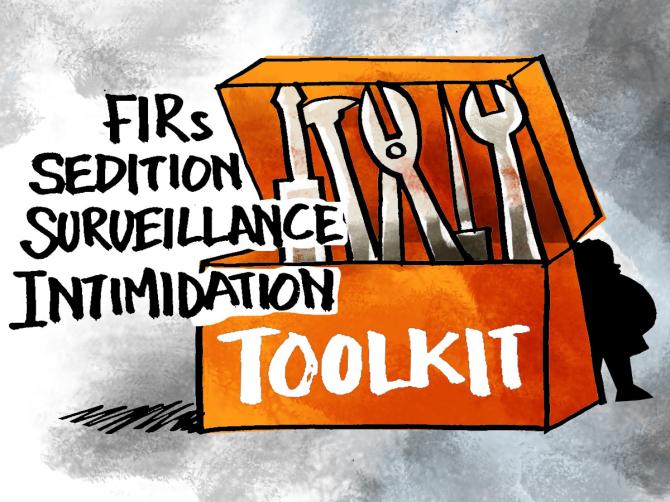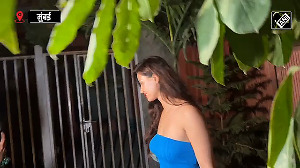'Many already toe the line, those on the fence will be nudged to stand with the government even more, those who are critical will face trouble soon.'

Aakar Patel, columnist and former executive director of Amnesty International in India, tells Rediff.com's Prasanna D Zore how the Narendra Damodardas Modi government wants to curb and control the political narrative across social and digital media and over the top (OTT) platforms that use the Internet to stream digital content.
How will the recently notified Information Technology (Intermediary Guidelines And Digital Media Ethics Code) Rules, 2021, affect the functioning of digital news media, social media and OTT platforms in India?
They give the government overwhelming and arbitrary power to censor and block media, target individuals and groups critical of it, intrude on freedom of expression and creativity, encourage self-censorship and alignment of content on OTT with what the government wants and potentially end social media privacy.
How do these newly minted rules hamper the reportage of online portals that are critical of the Modi government's policies?
They give bureaucrats the authority to target news portals critical of the government. A news report in The Caravan also identifies the ones the government dislikes -- TheWire.in and Scroll.in among others.
What exactly does the Modi government want to regulate with these rules?
Are we sinking deeper into an undeclared Emergency where the government of the day will decide what can be published and what can't be published?
One can only speculate. It appears as if the bad tidings on the economy, employment, effects of Hindutva and on global indices of various types are sought to be papered over.
All authoritarian governments seek more control, not less. In that sense 'minimum government' is meaningless as a phrase.
So is the PM's speech that IAS officers are not qualified for everything. Here he's given them an additional task by authorising them to edit content.
What exactly is the government's motive in framing the new rules?
To control the narrative. It does control the narrative to a large extent now. It seeks full control. No dissent.
How legit are the new rules given that they have yet to get parliamentary sanction?
Not very legit. It's overreach through extending into a new domain a 2000 law that never intended to do what these rules require.
Can the government enforce these rules without getting the nod from Parliament? If yes, how?
It appears that the government believes that it can be done through executive fiat. My guess is it will be challenged soon. Whether they are stayed or withdrawn is another matter.
Journalists should agitate to get them withdrawn. I've asked the Editors Guild executive to see if they can intervene.
Will the rules further strengthen the role of bureaucracy vis-à-vis the media?
Absolutely! It will give the bureaucracy even more control over media.
Already the Centre exercises control on media through giving out Rs 1,200 crore (Rs 12 billion) annually through DAVP advertising; another similar amount through PSUs. And control through licensing -- Raghav Bahl, one of our most reputable media figures, was denied a TV licence -- and agencies like ED: see what NDTV and NewsClick.in have had to go through.
How can the media adapt itself to operate under the new regime governing them?
It will be difficult. Many already toe the line, those on the fence will be nudged to stand with the government even more, those who are critical will face trouble soon.
What loopholes can the media exploit just like it did when the Emergency was imposed in June 1975?
The media wasn't particularly effective during the Emergency. Most proprietors were terrified of V C (Vidya Charan) Shukla (who became the information & broadcasting minister in the Indira Gandhi government in 1975 after Inder Kumar Gujral was ousted from the I&B ministry for not doing enough to tame the media; Shukla then used an iron hand to muzzle the media).
One or two clever moments are not reflective of the wider reality.
How should professional bodies like Press Council, Editors Guild tackle this? Are they doing anything at all?
They should engage with the government and make a representation immediately after studying the law. They should also consider challenging it.
Our trade has not been activist-minded. The Editors Guild Twitter handle says it is not a watchdog. But we have to stand up for a free media.
Have the lines of communication between media and government broken down? Irreparably so?
There's no one monolithic media. The government is on very good terms with most media. For instance, the two largest English news channels are extensions of the government. DD News isn't needed today.










 © 2025
© 2025